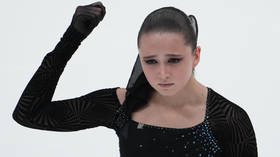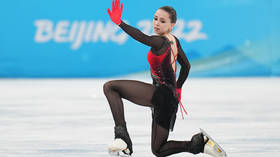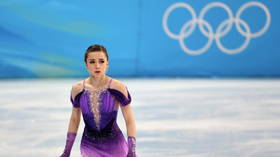Anti-doping chief shares ‘tentative’ plans for Valieva hearings

Hearings on the results of the investigation conducted into Olympic figure skater Kamila Valieva are “tentatively” planned for October, according to the head of the Russian Anti-Doping Agency (RUSADA).
RUSADA announced earlier in September that it had completed its investigation into the circumstances surrounding Valieva’s positive test for the banned heart drug trimetazidine, and that the matter would be taken up by a disciplinary anti-doping committee (DAC).
“There is a procedure for processing the results, we cannot name the date [of the hearings] yet,” said RUSADA general director Veronika Loginova at the ‘Russia – A Sporting Power’ forum in Kemerovo on Wednesday.
“The investigation was in relation to the staff, the coaching staff is included in it. Tentatively, October is the date for the announcement of the result.”
Loginova noted that the anti-doping code provided for a lengthy suspension in certain cases, but refused to second-guess what the outcome might be.
“In the code, we can see which sanctions can be applied for certain violations. There is a standard term of four years. But what the DAC decides – due to different circumstances, the decisions may be different,” Loginova added, according to RIA Novosti.
Valieva found herself at the center of scandal at the Beijing Winter Olympics in February, when it emerged she had tested positive for trimetazidine based on a sample collected around six weeks previously at the Russian Championships.
The delayed result was reported by a laboratory accredited by the World Anti-Doping Agency (WADA) in Stockholm, Sweden, and only appeared after Valieva had starred in her country’s gold medal success in the figure skating team event in Beijing.
Aged 15 at the time, Valieva was cleared to compete in the Olympic women’s individual event following an emergency hearing by the Court of Arbitration for Sport (CAS), despite the objections of WADA, the International Olympic Committee (IOC), and the International Skating Union (ISU).
The CAS panel cited Valieva’s status as a “protected person” due to her age in ruling that she should be allowed to participate, although the ordeal took its toll as she finished a disappointing fourth despite being the strong favorite for gold.
Valieva’s team – which includes renowned trainer Eteri Tutberidze – have vehemently denied any wrongdoing and have suggested that contamination from heart medication her grandfather was taking may have caused the positive test result.
Questions have also been asked about the lengthy delay of the test result, while Russian officials said Valieva had passed numerous other doping tests.
RUSADA chief Loginova said on Wednesday that Valieva’s age may also mean that the result of the disciplinary hearings is not disclosed.
“There are special rules for public disclosure regarding a protected person. I can’t say yet whether it will be published or not,” said the anti-doping official.
WADA has said it is closely monitoring the investigation in Russia and has reserved the right to take legal action should it not be satisfied with the procedure.
Valieva, now aged 16, returned to action last weekend at the Russian national team test skates in Moscow, where her two routines drew upon the theme of emotions from her Olympic scandal.
More broadly, Russian skaters remain banned from international competition due to a ban imposed by the ISU because of the conflict in Ukraine.














